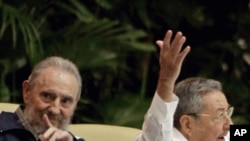For the first time in 14 years, Cuba's ruling Communist Party held a party congress recently to revamp its leadership and endorse new government policies announced since Raul Castro became president in 2008. As evidenced by the long gap between the two party conclaves, change comes slowly in the island nation.
While there was turnover in about half of the members of the Politburo and broader Central Committee, there was no sign of the generational transformation in leadership that many Cubans have hoped for. Political control remains in the hands of the close circle of Castro allies who have ruled Cuba for 52 years, and several are senior members of the army and navy who served with Raul Castro when he was the long-time minister of defense.
Some changes are purported to come at a party conference to be held in January, when the party will review a proposal by the president to impose term limits on all Party, and perhaps government, positions.
Term limits are potentially an important step in the right direction, but this alone will not guarantee that the Cuban people would be able to democratically determine their economic and political future. Many more reforms are needed, and the U.S. is committed to advancing policies that promote such democratic change, while engaging the Cuban government on these and other important issues.
Change Still Slow In Cuba

There was no sign of the generational transformation in leadership that many Cubans have hoped for.



